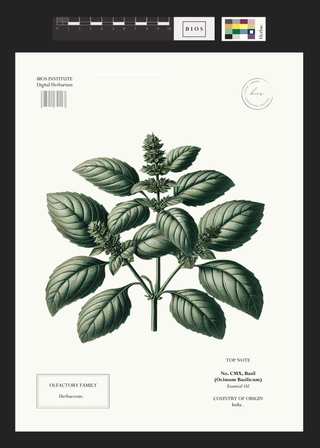

Basil (Ocimum Basilicum), known for its aromatic leaves and strong scent, is occasionally used in perfumery to add a unique herbal and spicy note to fragrances. Basil is native to the tropical regions of Asia, specifically the area that includes India, Iran, and other parts of Southeast Asia. It has a long history of cultivation and use in these regions. Basil was introduced to other parts of the world through trade and exploration, and it is now cultivated and consumed worldwide.
Basil has a distinct and refreshing aroma characterized by its herbal, slightly sweet, and spicy notes. The scent of basil can range from green and leafy to warm and peppery, depending on the variety. It has a lively and invigorating quality that adds vibrancy to perfumes.
Basil is often used to create herbal and fresh accords in perfumery. Its green and aromatic qualities can evoke a sense of vitality, cleanliness, and naturalness. Basil can add a crisp and energetic touch to fragrances, making it suitable for both men's and women's perfumes. Basil is a Top Note in our Herbaceous family.
Basil is frequently used as a complementary ingredient in perfume compositions. It blends well with various other fragrance notes, including citrus, floral, woody, and spicy accords. It can provide a bright and uplifting element that enhances the overall fragrance and adds complexity to the scent.
Basil has cultural significance in different regions and traditions. It is valued for its culinary uses, medicinal properties, and symbolic meanings. In some cultures, basil is associated with love, protection, and spiritual purification. The cultural significance of basil can influence its use and interpretation in perfumery.
While basil is occasionally used in perfumery, its use is relatively limited compared to other fragrance ingredients. It is more commonly found in herbal or aromatic fragrances, particularly those with a focus on natural and fresh themes.
Basil holds cultural significance in various regions and has been valued for its culinary, medicinal, and symbolic properties. Here are a few examples of the cultural significance of basil:
Basil has a long history of culinary use in different cultures, particularly in Mediterranean, South Asian, and Southeast Asian cuisines. It is valued for its aromatic flavor and is often used in dishes such as pesto, pasta sauces, salads, soups, and curries. Basil's inclusion in traditional recipes and its association with specific dishes contribute to its cultural significance in culinary traditions.
Basil has been used for its potential health benefits in traditional medicine systems. It is believed to have antibacterial, antiviral, and anti-inflammatory properties. Basil leaves and extracts are used in herbal remedies to alleviate digestive issues, respiratory problems, and stress-related ailments. In some cultures, basil is associated with healing, purification, and overall well-being.
Basil has symbolic meanings and spiritual connotations in certain cultures. In some traditions, basil is considered a sacred herb associated with protection, love, luck, and prosperity. It may be used in rituals, ceremonies, or spiritual practices to ward off negative energy, attract positive vibes, or enhance spiritual connections. Basil is sometimes placed in homes, temples, or sacred spaces for its purifying and calming qualities.
Basil has been the subject of folklore and superstitions in different cultures. For example, in Greek folklore, basil was believed to have the power to repel evil spirits and protect against misfortune. In some regions, basil leaves were placed under pillows to ward off nightmares or hung in doorways to bring good luck.
Basil
- Unit price
- /per
Please note this product format is a small vial that contains roughly 20 drops of scent concentrate. This can be purchased à la carte but is intended to be used with our Perfume Kit.
SCENT SPECIFICATIONS
Latin Name: Ocimum Basilicum
Extraction Method: Steam Distilled
Country of Origin: India
All of the scents in our library our naturally derived - our collection includes essential oils, absolutes, concretes, isolates, enfleurage, macerations, oleoresins, and mixed medium naturals.
Adding product to your cart
Basil (Ocimum Basilicum), known for its aromatic leaves and strong scent, is occasionally used in perfumery to add a unique herbal and spicy note to fragrances. Basil is native to the tropical regions of Asia, specifically the area that includes India, Iran, and other parts of Southeast Asia. It has a long history of cultivation and use in these regions. Basil was introduced to other parts of the world through trade and exploration, and it is now cultivated and consumed worldwide.
Basil has a distinct and refreshing aroma characterized by its herbal, slightly sweet, and spicy notes. The scent of basil can range from green and leafy to warm and peppery, depending on the variety. It has a lively and invigorating quality that adds vibrancy to perfumes.
Basil is often used to create herbal and fresh accords in perfumery. Its green and aromatic qualities can evoke a sense of vitality, cleanliness, and naturalness. Basil can add a crisp and energetic touch to fragrances, making it suitable for both men's and women's perfumes. Basil is a Top Note in our Herbaceous family.
Basil is frequently used as a complementary ingredient in perfume compositions. It blends well with various other fragrance notes, including citrus, floral, woody, and spicy accords. It can provide a bright and uplifting element that enhances the overall fragrance and adds complexity to the scent.
Basil has cultural significance in different regions and traditions. It is valued for its culinary uses, medicinal properties, and symbolic meanings. In some cultures, basil is associated with love, protection, and spiritual purification. The cultural significance of basil can influence its use and interpretation in perfumery.
While basil is occasionally used in perfumery, its use is relatively limited compared to other fragrance ingredients. It is more commonly found in herbal or aromatic fragrances, particularly those with a focus on natural and fresh themes.
Basil holds cultural significance in various regions and has been valued for its culinary, medicinal, and symbolic properties. Here are a few examples of the cultural significance of basil:
Basil has a long history of culinary use in different cultures, particularly in Mediterranean, South Asian, and Southeast Asian cuisines. It is valued for its aromatic flavor and is often used in dishes such as pesto, pasta sauces, salads, soups, and curries. Basil's inclusion in traditional recipes and its association with specific dishes contribute to its cultural significance in culinary traditions.
Basil has been used for its potential health benefits in traditional medicine systems. It is believed to have antibacterial, antiviral, and anti-inflammatory properties. Basil leaves and extracts are used in herbal remedies to alleviate digestive issues, respiratory problems, and stress-related ailments. In some cultures, basil is associated with healing, purification, and overall well-being.
Basil has symbolic meanings and spiritual connotations in certain cultures. In some traditions, basil is considered a sacred herb associated with protection, love, luck, and prosperity. It may be used in rituals, ceremonies, or spiritual practices to ward off negative energy, attract positive vibes, or enhance spiritual connections. Basil is sometimes placed in homes, temples, or sacred spaces for its purifying and calming qualities.
Basil has been the subject of folklore and superstitions in different cultures. For example, in Greek folklore, basil was believed to have the power to repel evil spirits and protect against misfortune. In some regions, basil leaves were placed under pillows to ward off nightmares or hung in doorways to bring good luck.
